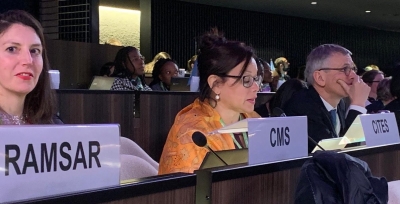 The Global Assessment Report on Biodiversity and Ecosystem Services, launched today in Paris, confirms that species and ecosystems around the world are in rapid decline. Arresting this trend will require transformative change based on proven solutions.
The Global Assessment Report on Biodiversity and Ecosystem Services, launched today in Paris, confirms that species and ecosystems around the world are in rapid decline. Arresting this trend will require transformative change based on proven solutions.
The report was produced by nearly 150 leading international experts and approved by 130 governments under the auspices of the Intergovernmental Science-Policy Platform on Biodiversity and Ecosystem Services (IPBES).
It concludes that the proportion of species currently threatened with extinction averages some 25 per cent across the many terrestrial, freshwater and marine vertebrate, invertebrate and plant groups that have been sufficiently studied. The rate of extinction is set to accelerate.
According to the IPBES report, the main direct drivers of species extinction are (in descending order): changes in land and sea use, direct exploitation of organisms (including hunting, fishing and logging), climate change, pollution and invasive alien species.
“The findings of the Global Assessment Report underline why the work of CITES is so essential for the future of both wildlife and humanity,” said CITES Secretary-General Ivonne Higuero.
“By ensuring that wild plants and animals are not overexploited through unsustainable trade, CITES makes a practical and effective contribution to conserving biodiversity and protecting ecosystem products and services. At the same time, our work on the sustainable use of wildlife and the engagement of local communities helps to reduce poverty and strengthen livelihoods,” she said.
The Global Assessment notes that the eight-fold increase in global trade and the six-fold increase in the global economy over the past 30 years has doubled the demand for living materials from nature. Humanity is on track to meet only one quarter of the goals across CITES and five other global agreements relating to nature and the protection of the global environmental commons. This in turn threatens to undermine progress towards the UN Sustainable Development Goals.
In light of the milestone global assessment report and second work programme, we look forward to ever-stronger collaboration and alignment between IPBES and each of the biodiversity-related conventions to realize our individual and collective potential and strengthen the impact of our work. We will report back to the Parties of our different Conventions and invite them to discuss how to best ensure synergies towards our common goal of biodiversity conservation and sustainable use as a tool for sustainable development.
The Global Assessment is available at www.ipbes.net